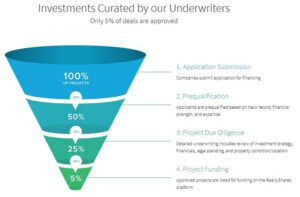Real Estate
Real estate crowdfunding is a new way to invest in real estate. It allows you to pool your money with other people and earn a return. You can invest in a wide variety of properties including commercial, retail, residential, and more. If you’re considering a crowdfunding investment, you’ll want to do your research and learn about the benefits of this type of investing.
Investing in crowdfunding real estate websites has never been risk-free. The risks can be mitigated with prudent due diligence, but you should be prepared to lose your money. A good rule of thumb is to invest no more than you can afford to lose.

As with all forms of investing, there are benefits and drawbacks to real estate crowdfunding. While it can be a great way to build a portfolio of financial investments, it’s important to consider all your options. Taking the time to find a good platform can minimize your risk. Using the proper wallet management tools can help you keep track of your contacts, create new transactions, and manage investor payouts.
Real Estate Crowdfunding Definition
One of the advantages of real estate crowdfunding is that you can easily monitor the history of all your actions. If you have a website, you can promote your fundraising campaign to your existing network and generate positive word of mouth. This will boost your fundraising efforts and increase your funding options.
One of the perks of crowdfunding real estate websites is that you’ll be able to invest in projects that are highly sophisticated. Before the advent of crowdfunding, only the wealthiest of investors were able to participate in institutional-caliber real estate deals. With crowdfunding, any person with a few hundred dollars can make an investment.
Unlike traditional investments, you won’t get an immediate return from your real estate crowdfunding investment. Investors generally receive a portion of the profits that come from the sale of the building or the property itself. Alternatively, they can receive a fixed interest rate on their investment. They also have the option to take a depreciation expense deduction on the value of the property.
However, real estate crowdfunding isn’t always the best route to take. Some platforms are ill-equipped to handle a downturn. For example, the company that created RealtyShares, one of the largest crowdfunded real estate ventures of all time, went out of business. Moreover, the downturn is expected to hit the real estate industry harder than any other sector.
There are other advantages to real estate crowdfunding, however. You can choose a real estate project that fits your personal needs and objectives, and it’s a great way to diversify your portfolio without sacrificing commercial real estate assets. Another advantage is that you’ll have the option to generate a profit on the back end of your deal, if it’s successful.
Although real estate crowdfunding is relatively new, it’s still a growing niche. If you’re interested in incorporating a crowdfunding strategy into your investment portfolio, consider the five tips below. In the end, the best way to protect yourself from the unexpected is to be diligent and avoid making any investments you need while your deal is in progress.